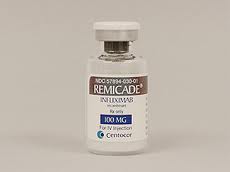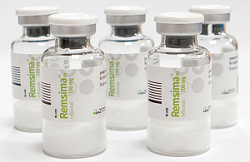 Johnson & Johnson ($JNJ) is feeling the pain from Remicade biosimilars outside the U.S. But it's got a message for worried investors who fear this is just the beginning of a massive downward spiral: Biosimilars are not generics.
Johnson & Johnson ($JNJ) is feeling the pain from Remicade biosimilars outside the U.S. But it's got a message for worried investors who fear this is just the beginning of a massive downward spiral: Biosimilars are not generics.
As CEO Alex Gorsky reassured shareholders on last week's Q4 conference call, J&J doesn't foresee the kind of U.S. downfall for Remicade that often plagues products when generics hit. A lot can depend on what kind of data the knockoffs have--and what kind of guidance regulators provide around substitutability. And beyond that, "we think that the differences between molecules … manifest themselves in significant ways with patients," he noted.
Plus, the company believes, 70% of its Remicade patients "have a pretty high satisfaction rate"--meaning the population likely to make a switch is only in the 30% range.
"We believe doctors will be reluctant to switch them off with that level of success. And we've seen this play out in many markets where biosimilars have already been introduced," he said.
With all of that in mind, Gorsky told investors, even when a copy of its anti-inflammation giant does hit the drugmaker's home market, it will "lead to a significantly different curve than what you see with generics."

J&J is certainly hoping that's the case. The blockbuster is its top-selling product, bringing in $1.68 billion in Q4 sales. But the drug's market share has already begun to erode overseas, with knockoffs such as Remsima from Pfizer's ($PFE) Hospira and Celltrion snapping up share to help drive an 18.4% drop in international sales for Q4. And with the FDA's advisory committee meeting to review Celltrion's U.S. application just around the corner--it's scheduled for Feb. 9--investors have been antsy.
Gorsky isn't the only one who thinks Remicade biosims may face a tougher slog at home, though. In December, Bernstein analyst Ronny Gal wrote in a note to clients that physicians he's spoken with haven't been "nearly as impressed" by Remsima data as they have been with Novartis' ($NVS) Zarxio, the only biosimilar currently on the U.S. market. And because of that, they "saw no reason to take risk on the biosimilar unless the data is perfect (and even then, only when required by the payer)."
Of course, some payers have been pretty enthusiastic about the advent of biosimilars, with PBM giant Express Scripts ($ESRX) saying it's eager to adopt the meds and reap the expected savings. But in the U.S., there are still other barriers that could prevent biosimilars from seeing the success they're seeing elsewhere--for now, at least. As Gal pointed out, educational efforts about the drugs are still in the early stages, and IP barriers and a "fractured commercial market" are still posing problems for copycat drugmakers.
One day, he believes, the U.S. market will be able to catch up to its more-developed European counterpart, but there may just be "a more prolonged path to take us there," he said. "… The devil would be in the details."
- read the call transcript
Special Reports: The 10 best-selling drugs of 2013 - Remicade | Top 20 generics companies by 2014 revenue - Hospira